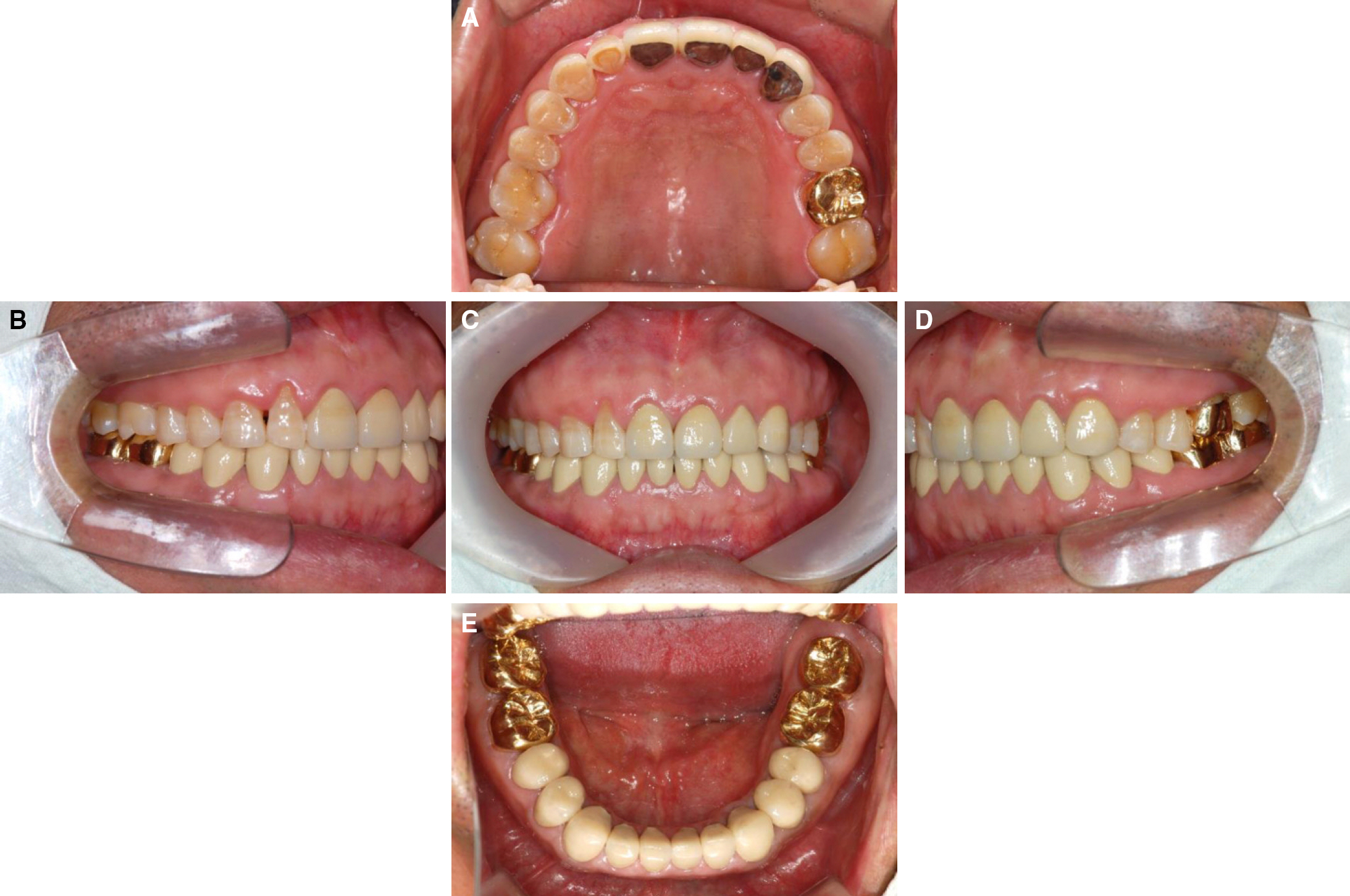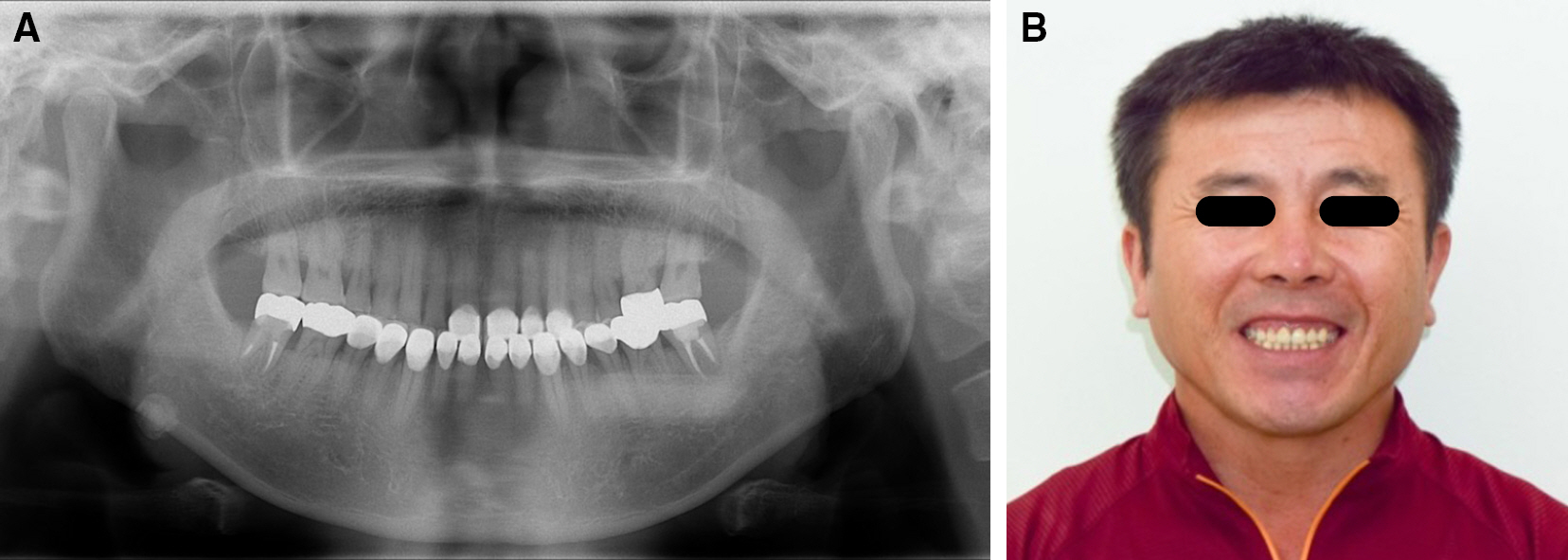J Korean Acad Prosthodont.
2015 Jul;53(3):215-221. 10.4047/jkap.2015.53.3.215.
Mouth rehabilitation of a patient with severely worn dentition with vertical dimension increase
- Affiliations
-
- 1Department of Dentistry, Graduate School, Wonkwang University, Iksan, Republic of Korea. pro11@wku.ac.kr
- KMID: 2195251
- DOI: http://doi.org/10.4047/jkap.2015.53.3.215
Abstract
- Treating patients with severely worn dentition often requires comprehensive prosthetic treatments. Oral rehabilitation and long-term stability could be achieved by analyzing the cause of the wear and changing vertical dimension. The temporary restoration procedure is executed and patient's adaptation is evaluated by long-term observation when treatment is accompanied with increasing vertical dimension. In this case, 54 year-old male presented with worn dentition and esthetic dissatisfaction. In oral manifestations, severely worn dentition with attrition and erosion is diagnosed. To evaluate change of vertical dimension, interocclusal rest space, facial appearance, pronunciation, clinical crown length, distance from incisor edge to labial vestibule are evaluated. Consequently, 2.5 mm increase of vertical dimension that based on articulator incisal pin is determined. After 8 weeks stabilization period with temporary prostheses, definitive prostheses are fabricated. After 6 months follow up period, satisfactory outcomes were achieved both in functional and esthetic aspects through this procedure.
Keyword
MeSH Terms
Figure
Reference
-
1. Hattab FN, Yassin OM. Etiology and diagnosis of tooth wear: a literature review and presentation of selected cases. Int J Prosthodont. 2000; 13:101–7.2. Dawson PE. Functional occlusion from TMJ to smile design. Elsevier inc.;2008. p. 430–52.3. Turner KA, Missirlian DM. Restoration of the extremely worn dentition. J Prosthet Dent. 1984; 52:467–74.
Article4. Verrett RG. Analyzing the etiology of an extremely worn dentition. J Prosthodont. 2001; 10:224–33.
Article5. Grippo JO, Simring M, Schreiner S. Attrition, abrasion, corrosion and abfraction revisited: a new perspective on tooth surface lesions. J Am Dent Assoc. 2004; 135:1109–18.6. Bloom DR, Padayachy JN. Increasing occlusal vertical dimension–why, when and how. Br Dent J. 2006; 200:251–6.7. Seo JM. Full mouth rehabilitation in a patient with severely worn dentition. J Dent Rehabil Appl Sci. 2010; 26:463–76.8. Kim YL. Rehabilitation of the worn dentition. J Dent Rehabil Appl Sci. 2010; 26:455–62.9. The glossary of prosthodontic terms. J Prosthet Dent. 2005; 94:10–92.10. Park JH, Jeong CM, Jeon YC, Lim JS. A study on the occlusal plane and the vertical dimension in Korean adults with nat-ural dentition. J Korean Acad Prosthodont. 2005; 43:41–51.11. Abrahamsen TC. The worn dentition-pathognomonic patterns of abrasion and erosion. Int Dent J. 2005; 55:268–76.12. Abduo J, Lyons K. Clinical considerations for increasing occlusal vertical dimension: a review. Aust Dent J. 2012; 57:2–10.13. Hemmings KW, Howlett JA, Woodley NJ, Griffiths BM. Partial dentures for patients with advanced tooth wear. Dent Update. 1995; 22:52–9.14. Abduo J. Safety of increasing vertical dimension of occlusion: a systematic review. Quintessence Int. 2012; 43:369–80.15. Gross MD, Ormianer Z. A preliminary study on the effect of occlusal vertical dimension increase on mandibular postural rest position. Int J Prosthodont. 1994; 7:216–26.
- Full Text Links
- Actions
-
Cited
- CITED
-
- Close
- Share
- Similar articles
-
- Complete mouth rehabilitation with vertical dimension increase in patient with extremely worn dentition
- Full-mouth rehabilitation with increasing minimum vertical dimension in the patient with severely worn dentition and deep bite
- Full-mouth rehabilitation without changing the vertical dimension in patient with worn dentition
- Full mouth rehabilitation with extremely worn dentition
- Full mouth rehabilitation using zirconia crown in severe worn dentition: a case report







